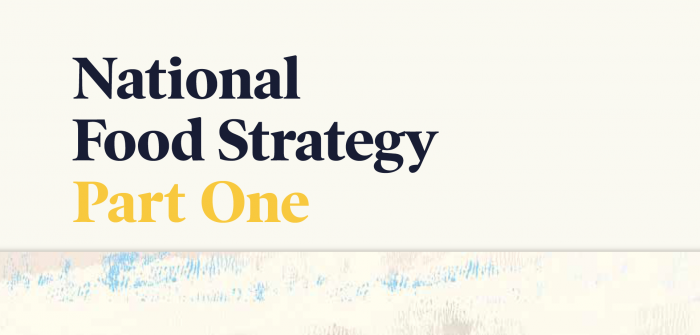The UK Government should aspire to a ‘gold standard level of scrutiny’ when it comes to food standards as it formulates new trade deals, according to the new the National Food Strategy.
The first part of Henry Dimbleby’s far-reaching strategy has been published today with a core focus on future trading arrangements and addressing diet-related health issues, particularly in disadvantaged children.
It concludes that the UK now has a ‘once-in-a-lifetime opportunity’ to decide what kind of trading nation it wants to be, addressing head on the concerns over the impact of potential trade deals with the likes of the US on UK food production standards, a huge issue for the pig sector.
The report calls for the adoption of a statutory duty that would give Parliament the opportunity to properly scrutinise any new trade deals.
It rejects the idea of legislation requiring imports to meet UK standards, but urges the Government to only cut tariffs on products which meet the UK’s ‘core standards’.
This would be achieved through ‘verification programmes’ enabling American farmers to sell non-hormone-treated beef to the UK, for example, or, in the case of pigs, potentially only ractopamine-free pork. Certification schemes should also be extended to environmental and climate protections where the impact is severe, for example, maintaining tariffs on beef reared on land recently cleared of rainforest, the report suggests.
Mr Dimbleby’s advisory panel comprises experts representing farming, including NFU president Minette Batters, alongside various industry, Government and environmental organisations and academics.
The first of two reports comes up with what it describes as ‘urgent recommendations to support this country through the turbulence caused by the COVID-19 pandemic, and to prepare for the end of the EU exit transition period on December 31, 2020’. A comprehensive plan for transforming the food system will follow in part two.
Trading standards
On post-Brexit trade, the report states that: “For the first time in nearly half a century, we can – and must – decide for ourselves how we want to trade with the rest of the world.
“UK farmers and food producers have some of the highest environmental and animal welfare standards in the world. This is something to be proud of. There is justifiable concern about opening up our markets to cheaper, low-standard imports which would undercut our own producers and make a nonsense of our progressive farming policies.”
It stresses, however, that negotiating trade deals is hard and concludes any blanket legislation requiring other countries to meet our own food guidelines, as pursued by some MPs as the Agriculture Bill makes its way through parliament, would make it ‘nigh-on impossible’.
“We already import many food products from the EU that don’t meet UK standards,” the report says. “A blanket ban would make it impossible to continue trading even with this most closely aligned of partners.”
“There is a subtler mechanism we could use to put in place specific trading standards, without requiring a universal ban. The Government should only agree to cut tariffs in new trade deals on products which meet our core standards.
“Verification programmes –along the lines of those currently operated by the US Department of Agriculture to enable American farmers to sell non-hormone-treated beef to the EU – should be established, so that producers wishing to sell into the UK market can, and must, prove they meet these minimum standards.
“At a minimum, these certification schemes should cover animal welfare concerns and environmental and climate concerns where the impact of particular goods are severe (for example, beef reared on land recently cleared of rainforest).”
It says the core standards should be defined by the newly formed Trade and Agriculture Commission, which has just met for the first time, while the Government should adopt a statutory responsibility to commission and publish an independent report on any proposed trade agreements.
The scope of the impact report should include: economic productivity; food safety and public health; the environment and climate change; society and labour; human rights; and animal welfare. It would be presented alongside a government response when any final trade treaty is laid before parliament.
“It is important that government decisions – especially those with such profound consequences as new trade deals – should be properly scrutinised,” the report states.
“The Government should adopt a statutory duty to give Parliament the time and opportunity to properly scrutinise any new trade deal. It must allow time for relevant select committees to produce reports on any final deal, and allow a debate in the House of Commons.”
Reaction
NPA senior policy adviser Ed Barker said the report made a number of ‘very positive’ recommendations on the key themes of accessible and nutritious food, trade standards and food affordability.
“Pork is certainly well placed to deliver nutritional quality and affordability and we will be looking to see how we as an industry can better position ourselves to promote these benefits to consumers, in line with the aims of the report,” he said.
“We also very much welcome the report’s stance on trade, which sends out a clear message to Government that close scrutiny of future trade deals is essential so we can ensure our standards of production are not undermined.
“We are pleased that Mr Dimbleby appears to recognise the specific issues concerning pig production, including the widespread use of sow stalls in the US. This is another clear indication of the strength of feeling on this issue.
“We look forward to seeing the development of this strategy and will continue to feed into the process from the perspective of the British pig sector.”





